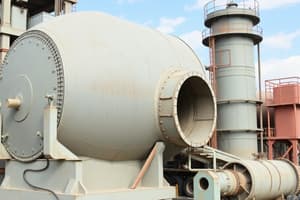Podcast
Questions and Answers
What causes unsoundness in cement?
What causes unsoundness in cement?
- Excessive application of water during mixing
- Low temperature during setting
- Reactions of gypsum with C3A (correct)
- Rapid hydration of free lime or magnesia
What is the limit for autoclave expansion according to ASTM C150?
What is the limit for autoclave expansion according to ASTM C150?
- 1.5%
- 1.0%
- 0.5%
- 0.8% (correct)
Which of the following tests determines both initial and final setting times of cement?
Which of the following tests determines both initial and final setting times of cement?
- The Vicat Test (correct)
- The Compressive Strength Test
- The Slump Test
- The Shear Test
What characterizes the ‘initial set’ of cement?
What characterizes the ‘initial set’ of cement?
What is the minimum initial setting time according to the Gillmore needle test?
What is the minimum initial setting time according to the Gillmore needle test?
What is defined as the mass of a unit volume of the solids or particles in cement?
What is defined as the mass of a unit volume of the solids or particles in cement?
What is the specific gravity range for cement?
What is the specific gravity range for cement?
Which test is mostly used to measure the fineness of cement?
Which test is mostly used to measure the fineness of cement?
Which of the following statements accurately describes the relation between fineness of cement and hydration?
Which of the following statements accurately describes the relation between fineness of cement and hydration?
What property measures the ability of a hardened cement paste to retain its volume after setting?
What property measures the ability of a hardened cement paste to retain its volume after setting?
What is one consequence of using high fineness in cement?
What is one consequence of using high fineness in cement?
How is fineness of cement expressed?
How is fineness of cement expressed?
What is the typical weight of a commercial bag of cement in Saudi Arabia?
What is the typical weight of a commercial bag of cement in Saudi Arabia?
What is the primary use of Portland cement?
What is the primary use of Portland cement?
Which of the following is not a physical property assessed for Portland cement?
Which of the following is not a physical property assessed for Portland cement?
How does the bulk density of cement change?
How does the bulk density of cement change?
What does a higher bulk density of cement typically indicate?
What does a higher bulk density of cement typically indicate?
What is the significance of measuring cement by mass rather than volume during batching?
What is the significance of measuring cement by mass rather than volume during batching?
Which of the following properties can affect the time of setting of cement?
Which of the following properties can affect the time of setting of cement?
What range of values can the bulk density of cement vary between?
What range of values can the bulk density of cement vary between?
Which testing method is used to assess the physical properties of cement as per ASTM standards?
Which testing method is used to assess the physical properties of cement as per ASTM standards?
What is the primary characteristic of false set in concrete?
What is the primary characteristic of false set in concrete?
Which of the following accurately describes flash (quick) set?
Which of the following accurately describes flash (quick) set?
What effect does low gypsum content in cement have?
What effect does low gypsum content in cement have?
Which factor does NOT affect the heat of hydration?
Which factor does NOT affect the heat of hydration?
What is the usual method to measure the consistency of cement paste?
What is the usual method to measure the consistency of cement paste?
What will happen if gypsum content in cement is too high?
What will happen if gypsum content in cement is too high?
At what stages are hydration heat measurements typically taken?
At what stages are hydration heat measurements typically taken?
What characteristic does the heat of hydration depend on?
What characteristic does the heat of hydration depend on?
What is the diameter of the needle used in the Vicat test for initial setting time?
What is the diameter of the needle used in the Vicat test for initial setting time?
According to ASTM C 150, what is the minimum initial setting time for Portland cements?
According to ASTM C 150, what is the minimum initial setting time for Portland cements?
What indicates the final setting time in the Vicat test?
What indicates the final setting time in the Vicat test?
Which apparatus is less commonly used than the Vicat apparatus?
Which apparatus is less commonly used than the Vicat apparatus?
In the Gillmore test, what signifies the initial setting of cement?
In the Gillmore test, what signifies the initial setting of cement?
What is considered the maximum final setting time for Portland cement according to ASTM C 150?
What is considered the maximum final setting time for Portland cement according to ASTM C 150?
What does early stiffening of cement paste refer to?
What does early stiffening of cement paste refer to?
What is the significance of the difference in results between the Vicat and Gillmore tests?
What is the significance of the difference in results between the Vicat and Gillmore tests?
Flashcards are hidden until you start studying
Study Notes
Cement Properties
- Portland cement is a fine powder that, when mixed with water, acts as a binder for aggregates in concrete.
- The quality of Portland cement is assessed based on its physical properties.
- Bulk density measures the mass of the cement particles and air voids per unit volume.
- The bulk density of cement varies depending on handling and storage.
- Cement should be measured by weight for concrete batching due to varying density.
- Density refers to the mass of a unit volume of cement solids, excluding air.
- Specific gravity is the ratio of cement density to water density, ranging from 3.10 to 3.25.
- Fineness refers to the particle size distribution, and it significantly impacts the hydration rate and properties of the cement.
- Finer cement particles lead to faster strength development, higher heat evolution, and increased water demand for workability.
- Cement fineness is expressed as the specific surface area, typically in m2/kg.
Testing Methods for Cement Properties
- Bulk density: Not a standardized test, but measured using a specific volume container.
- Density and specific gravity: Determined using a Le Chatelier flask and kerosene or a helium pycnometer.
- Fineness: Measured using the Wagner Turbidimeter test, Blaine Air Permeability test (most widely used), or by determining the percentage passing through a 0.045mm sieve.
- Soundness: Evaluated using the ASTM C150 standard test for Autoclave Expansion of Portland Cement, which measures the expansion after autoclaving to detect unsoundness due to excess free CaO or MgO.
- Time of setting: Determined using the Gillmore needle test or the Vicat test.
- Consistency: Measured using the Vicat apparatus or the flow table test.
- Heat of hydration: Measured using ASTM C 186 or conduction calorimetry, and reported in cal/g or kJ/kg.
Time of Setting and Hardening
- Initial setting time: The time when the cement paste begins to stiffen and can no longer be molded.
- Final setting time: The time when the cement paste has hardened enough to sustain a load.
- Stiffening: The gradual loss of consistency as the cement hydrates.
- False set: A temporary loss of plasticity due to rapid early stiffening, which can be reversed by further mixing.
- Flash (quick) set: A sudden and irreversible loss of workability due to rapid and excessive hydration, often caused by insufficient gypsum content.
- Gypsum's role: Regulates the setting time of cement by slowing down the hydration process.
Studying That Suits You
Use AI to generate personalized quizzes and flashcards to suit your learning preferences.





